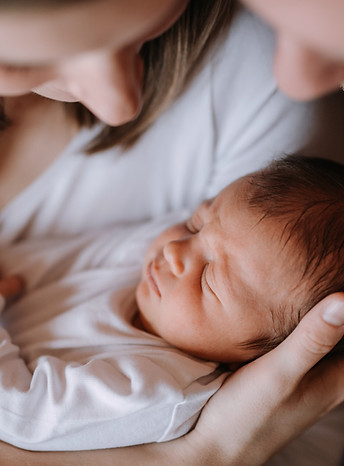
Babies & Carers
Long before they speak, babies communicate — through their cries, their facial expressions, their movements, and their bodies. From birth, and even in utero, babies are affected by their emotional environment. Neuroscience has shown that a foetus is capable of perceiving and remembering stimuli, and that early experiences begin shaping the nervous system and emotional life well before words emerge.
Grounded in psychoanalytic thinking, our work with babies recognises that emotional life begins at the very beginning. Inspired by pioneers such as Donald Winnicott and Françoise Dolto, we view the infant not as a passive recipient of care, but as an active individual — already responding to the world, to the presence, or absence of others, and to their environment in deeply meaningful ways.
Sometimes, babies show signs of distress that don’t have an obvious medical explanation: persistent crying, feeding issues, sleep difficulties, persistent intense reactions, or difficulties bonding with caregivers. These can be expressions of emotional tension or overwhelming early experiences — including those related to birth, hospitalisation, trauma, or challenges in the parent-infant relationship.
Our work creates a space to listen to early signs of distress and support the baby’s development through careful observation, reflective conversations with caregivers, and attention to the emotional dynamics at play. All of this work happens with the parent or caregiver present — attending not only to the baby’s signals and the caregiver’s own experience, but also to the interaction between them. This shared space helps strengthen a secure, responsive, and attuned dynamic.
This kind of early intervention can help restore emotional continuity, support the development of trust and safety, and reduce the risk of more persistent difficulties later in life.
When a baby is in physical or emotional distress, it can interfere with their capacity to feel safe, connect, and invest in the world around them. Holding, handling, and an attuned presence offer a way to meet the baby in their experience — supporting a sense of continuity, connection, and vitality.

What We Can Help With


We support babies and their carers, when babies show signs of emotional distress — such as persistent irritability, sleep or feeding difficulties, persistent intense reactions, or struggles in bonding and connection. Our work also includes supporting families facing early medical interventions, developmental concerns, or overwhelming experiences during pregnancy or after birth. When a baby’s emotional availability seems affected, we work closely with caregivers to understand and respond to what may be unfolding in the infant’s inner world, and in the relationship.